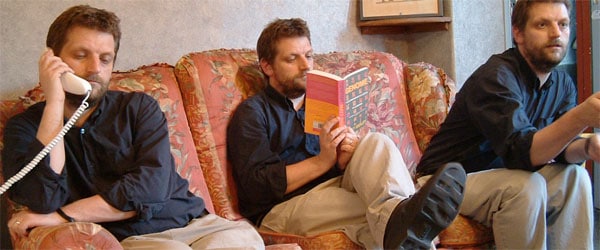A while back, I read an article on Bitesize Bio entitled “When Your Partner is NOT a Scientist” that piqued my interest…for the wrong reasons.
And I discovered that I hold polar opposite views on balancing a marriage and an occupation as a scientist. So I was compelled to write this article, not to be an egotistical contrarian, but simply to provide readers with another set of lenses through which to view the joys and difficulties of balancing relationships and science.
Nearly every science-related endeavor is time consuming. I’m sure I could postulate this as a governing physical law and it would be met in the sciences with overwhelming agreement.
Between experiments, grant writing, paper writing, a thorough literature survey (i.e. ALL of the literature), administrative duties, meetings, lunches, brunches, classes, mentoring, teaching, and a paltry 24 hours each day, we must inevitably decide how to partition our time in order to make significant progress.
Throw in a marriage, children, and/or another extracurricular pursuit and the demands are mindboggling. However, with a sound perspective, these demands can be properly navigated to yield fruitful lab work and a thriving home.
Here are my 7 tips:
1. Learn to predict when you will go overtime in the lab so you can be consistently ON TIME for your spouse.
Try to give a true estimate of when you will be home, accounting for the fact that things in the lab nearly always take longer than you expect them to (see my proposed physical law above). And, when things take significantly longer than the estimate you give, sincerely apologize to your spouse and ask forgiveness. I guarantee it is better to talk about these things openly and honestly than to show up late every day until your spouse gives up in complete frustration and desperation. One thing that might help here is to keep track of how far off your estimates of how long something will take actually are. More on this here.
2. Don’t rely on your spouse to keep house.
It is very likely that your spouse has time-consuming responsibilities and commitments of their own. Make a plan to distribute the household maintenance accordingly and work hard with your spouse. Of course, the exact distribution will vary based on individual situations, but your spouse will likely appreciate the fact that you are willing to help in whatever way you can (rather than just the comments you make on all of the things they have accomplished without your help).
3. Don’t bring work (even email) with you on vacation.
If you cannot leave your computer at home when you go on vacation, then you are not on vacation (look it up). If you are tied to your computer to the extent that you refuse to part with it when you go on vacation, your spouse has every right to be upset. If your job is such that you cannot afford the time for a vacation every once in a while, then your job and your marriage are incompatible (and I’ll give you a hint – it’s not the marriage that should end).
4. At work related functions, help your spouse get involved in the conversation.
Ask your colleagues non-research related questions. What are they like as PEOPLE? Your spouse can easily participate in these types of conversations and get to know the people you work with as well. If you’d like to stay enveloped in a scientific mindset without talking science, you are free to observe and analyze their personalities systematically.
5. Talk about work when you are at home.
Share with your spouse what is going on in the lab, even if it takes an extra 15 minutes of explanation…and they still might not understand. He or she will likely appreciate your desire to include them in your day-to-day struggles and successes and be happy that you are allowing them to walk side-by-side with you throughout life – an ideal that I’m sure you both held upon getting married.
6. Make your respect for your partner’s intellect known.
Based on my experience, your spouse may at times feel somewhat intimidated or insecure because you are in an intellectually heavy field. I believe my spouse is very intellectually competent, but simply doesn’t have the background that I do in biological sciences. However, make sure your spouse KNOWS that this is how you feel. Why? Because it is actually true. Plenty of people outside the biological sciences are brilliant – a point sometimes forgotten in the sciences.
7. Here is the boldest tip of all…are you ready for it?
Be prepared to give up your position as a scientist, if necessary, for your marriage. If you are married and it is failing to thrive or failing altogether, no occupation is worth the devastation of an unkept promise of lifelong commitment (whether you have kids or not). Living parallel lives does not qualify as a thriving marriage. You must take an active interest in your spouse’s life and they in your life. If you are not yet married and think you would like to devote yourself entirely to science (or any pursuit, for that matter), I would also be so bold as to assert you that you should not marry. If you intend to build a family, do it well.
Marriage and science DO go together
Let us not forget the purpose of this article. It is to address the notion of being in a relationship with someone who is not a scientist. As it turns out, it’s not bad at all!
Sure, your partner may not be able to help you design experiments, give input on data interpretation, or get you out of a pinch in technically complex scientific writing. Thankfully, if you are in a position like me, you find yourself surrounded by brilliant colleagues eager to help you solve any peculiarity you run across. As a result, your spouse is relieved of the pressure of filling a role that, as a non-scientist, they cannot be expected to excel at. Knowing that you do not expect them to solve difficult experiment-related issues can go a long way to replenish his or her unmerited decrease in self-confidence.
Now here comes the potentially unpopular view: I believe a good marriage and raising children well ought to be held ABOVE whole-hearted, ceaseless occupational devotion. In this light, if you believe the two are compatible, you are wrong – choose one or the other but NOT both.
This doesn’t mean that you can’t be successful at simultaneously raising a family and being a scientist. You can! But if you believe that maximum occupational performance is the most noble goal, then I say “Great!” It is a noble goal…just pursue it without marry someone you will later take advantage of to achieve it.
This is a guest post for Bitesize Bio by Sean Cascarina





